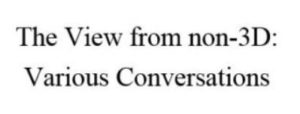
Saturday, February 12, 2011
Dr. Jung?
No, let it be just another of your anonymous guys upstairs for the moment, and then you can avoid being tempted to tailor the message to what you think you ought to be hearing.
That’s an interesting way to describe that particular pitfall.
Communication this way isn’t an exact science. So – to get your question answered, one of your guys:
You might look at your life in this new way, in addition to all the ways you currently look at it. In other words, here is one new analogy, not intended to replace the others but to supplement them. Think of yourself as being actively another “you” moment by moment, in the way that a television picture, say, could be considered another new picture every time the screen refreshes. In fact, that is a pretty good analogy, given that the screen refreshes partially continually, so that there are no separate pictures (though you could take a photo of one and seem to “prove” that is separate, when in fact you would have a photo of a picture partly refreshed and partly not yet refreshed, designed to provide an illusion of seamless motion).
As you refresh your picture of yourself, though, the older picture doesn’t exactly go away, as it seems to in time-space. Nor is it complete and separate as any moment must always appear to be. Rather it is in a state that is neither separate (a snapshot of the moment of time) or continuous (something that can only be perceived as part of the whole) but an indefinable state with no physical analogy, though that of an electronic stream producing the illusion of moving pictures is closer than any pre-electronic analogy could have been.
You can see that when describing something that ultimately amounts to “neither this nor that” and at the same time “both this and that,” different observers are going to latch onto different properties, and may fool themselves into thinking that they understand the thing itself.
Thus, some see static pictures. Some see a flow. Some see something whose nature is a little of each. By nature, 3-D cannot contain the larger reality, but can only grasp analogies. Three into two won’t go, so to speak, or in this case six into three.
Your mental world is not as straight-forward in operation as your experiences (and, if we may say it to one and all, your lack of careful introspection) lead you to believe. The continuity aspect we have described as threads. The individual-picture aspect we have described as Joseph (or whomever)-in-process. The net result of this subset of experiences we have described as completed-Joseph (or whomever).
Thus, you are continuous – and not. You are different people at different times in your life – and yet not really. You change and you choose and although you think forward, those changes and choices also affect you backwards.
Hard to see what that last statement means.
On a superficial level, it means that a change of view, a change of mind, gives you a new way of seeing (hence, experiencing) your past as well as anything else. So what you think your life is and was changes, sometimes moment to moment, as your present world changes.
To keep it simple: Suppose you, Frank, contact Joseph Smallwood. If you contact him in 1843, is he going to be the same man he is in 1848? He is and he isn’t. And vastly more so, if you alter his future by healing his back on July 4, 1863, is he the same man? Clearly not, you’d say – but what happens when you give someone a life-changing new idea, or new experience? Have you not produced another person, in a way? It is difficult to discuss this because (as always) the words get in the way. But if you can somehow remember that the word is not the thing, you can make allowances, and can remember that to speak of a continuous stream as though it were individual droplets is true at one level of examination and false at another.
So, you conduct sessions with TGU in 2001 and are given certain life-changing concepts. (Actually you were given these concepts earlier, most notably in the fall of 2000 in your 10 lab sessions at TMI.) Those concepts help shape your life in an on-going fashion, and you begin to think that every bit of you knows them and has accommodated them. Then you see that in a new circumstance, there is a part of you that doesn’t know what you’re talking about, or rather what you aren’t talking about because you’re taking it for granted.
This implies that there’s never an end to finding new parts of ourselves.
More, there’s never an end to your creating new parts of yourselves – and would you want there to be?